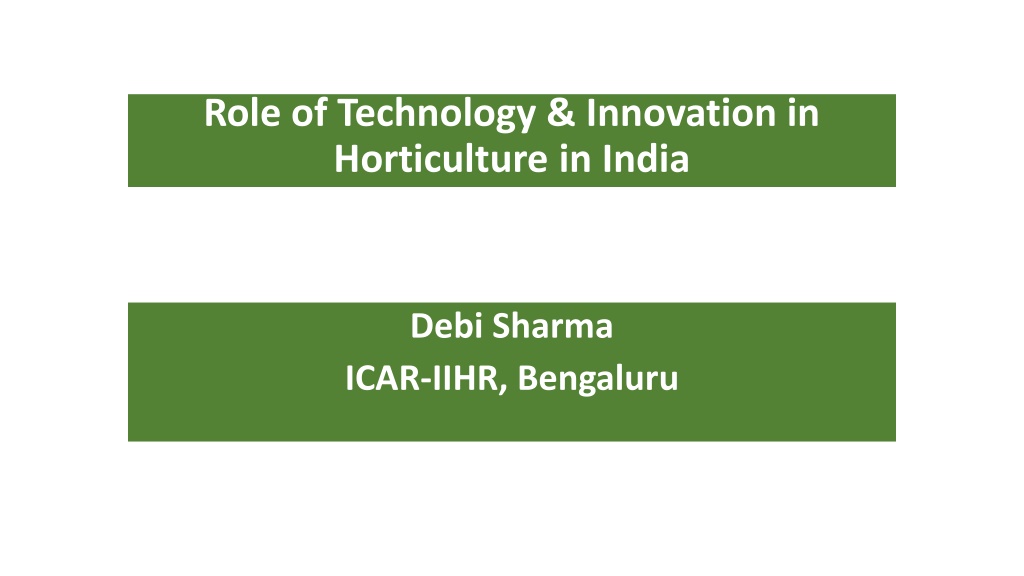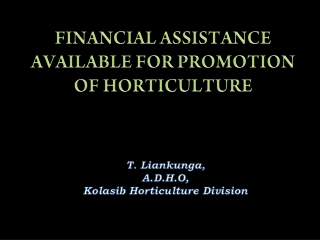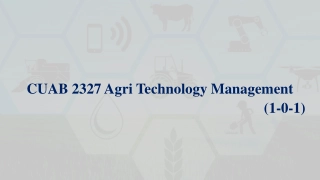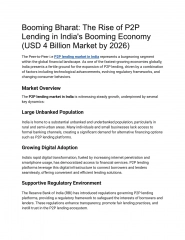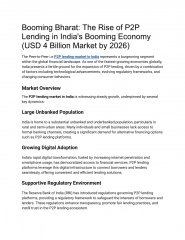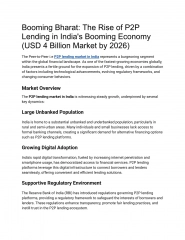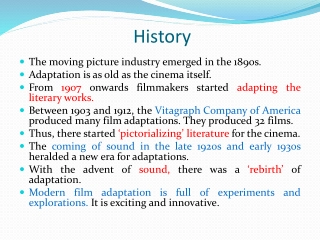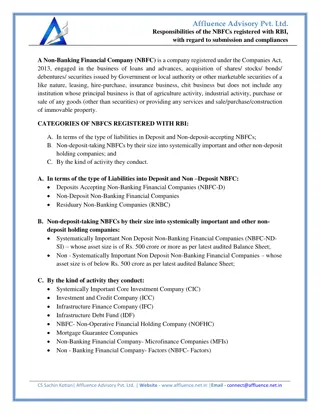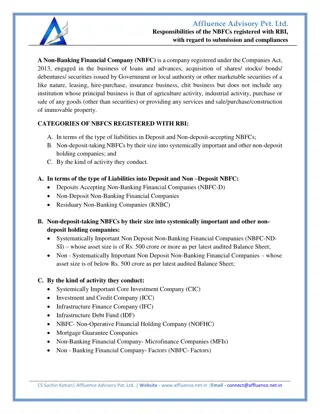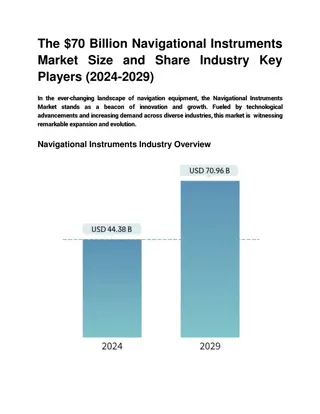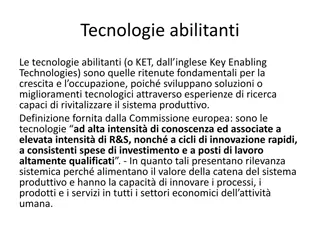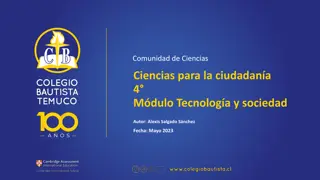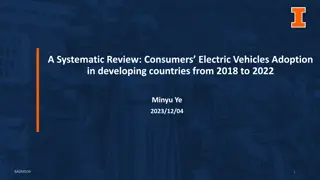Technological Innovations in Horticulture Sector of India
Technological innovations have played a crucial role in the development of horticulture in India, with the sector contributing significantly to the Gross Value Addition. Innovations include high-yielding and disease-resistant crop varieties, innovative production technologies, post-harvest management practices, and plant health management strategies. The increase in productivity and disease resistance in various horticultural crops has been remarkable due to these advancements. Additionally, innovative production technologies like new generation tissue culture systems and high-density planting methods have further enhanced efficiency and quality while reducing production costs.
Technological Innovations in Horticulture Sector of India
PowerPoint presentation about 'Technological Innovations in Horticulture Sector of India'. This presentation describes the topic on Technological innovations have played a crucial role in the development of horticulture in India, with the sector contributing significantly to the Gross Value Addition. Innovations include high-yielding and disease-resistant crop varieties, innovative production technologies, post-harvest management practices, and plant health management strategies. The increase in productivity and disease resistance in various horticultural crops has been remarkable due to these advancements. Additionally, innovative production technologies like new generation tissue culture systems and high-density planting methods have further enhanced efficiency and quality while reducing production costs.. Download this presentation absolutely free.
Presentation Transcript
Role of Technology & Innovation in Horticulture in India Debi Sharma ICAR-IIHR, Bengaluru
Innovations in Horticulture Technological Innovations - played a significant role in horticultural development in India. The Horticulture sector in India produces around 340 million tons of products and contributes to about 33% of the Gross Value Addition (GDA). Productivity of horticultural crops increased by 38% between 2004-05 and 2019-20. High yielding, disease resistant, high quality, varieties Innovative production technologies & interventions for higher seed/planting material production Post Harvest Management, uniform ripening, increasing shelf life Plant Health Management- Bio pesticides, Bio fertilisers, insect traps Ensuring Food Safety
Varieties for Increased Productivity & Disease Resistance Varieties for Increased Productivity & Disease Resistance ICAR-IIHR Guava Arka Poorna, Arka Kiran 32 -38t/ha Custard Apple Arka Sahan 18 -20 t/ha Tomato Arka Rakshak, Arka Abhed - 100-120 t/ha (MDR) Chilli Arka, Tejasvi, Arka Gagan, Arka Saanvi, Arka Tanvi 5-6 t/ha(LCV), Arka Meghana (Powdery Mildew & Virus resistant) French Bean Arka Arjun -18t/ha (YMV) Watermelon Arka Shyama 60-70 t/ha Musk melon - Arka Siri 25t/ha Ridgegourd Arka Vikram 34t/ha Tuberose Arka Prajwal 17t/ha Velvet bean Arka Dhanvantari, Arka Shubra 4-4.5t /ha Coconut: Chandra Sankara, Chowghat Orange Dwarf Kalpashree (Resistant to root wilt -ICAR-CPCRI) 2 to 6 fold increase in yield
Innovative Production Technologies New Generation Tissue Culture System ICAR-NRCB - customized bioreactor (SERV) and standardized the protocol for mass multiplication of Bananas using somatic embryos. One ml of Embryogenic cell suspension can produce approx. 40000 (cultivar specific) plants within 160 days Root Stocks High Density planting Plant Architecture Engineering Enhancing resource efficiency , quality of produce and reduced cost of production Y-trellis system for Mango, Grape HDP in guava, fig (ICAR-IIHR) Grape : Dogridge and 110R drought and salinity ( 56% area income gain 790 crores) Citrus rootstock Alemow : Resistant to Phytophthora (root rot & gummosis)- increased yields two times Citrus : Rangpur Lime drought resistance Mango : Vellaikulamban dwarfing (ICAR IIHR) Aeroponic system for potato minituber production - 7 to 10 times more number of minitubers from in-vitro plantlets (ICAR-CPRI)
Seed and Planting Material Production under Seed Village Concept A Success Story Group of farmers in a village /villages is selected - Agreement to procure seed at predetermined price Seed production programme is mainly concentrated in Davanagere, Chitradurga, Haveri, Bengaluru rural, Mandya, Ramanagar, Tumkur, Koppal and Chikkaballapur districts of Karnataka, Krinshnagiri & Dharmapuri districts in Tamil Nadu, Ananthapur in Andhra Pradesh & Nasik in Maharastra Around 43 tonnes of Vegetable seed, 2.23 lakh fruit plants, 13 lakh ornamental & 1.11 lakh medicinal & aromatic planting material worth about Rs. 9.00 crores, were produced during 2021-22. About 70 farmers benefitted by this programme during 2021-22. Farmers are getting at least 2 times more income from seed crop than from commercial crop production guaranteed income. Sale linked to SBI s Yono app and ICAR-IIHR website
Post Harvest Management Post Harvest Management New generation controlled onion storage structure Capacity to store onions for six months with minimum storage loss of only 15% ( varying capacities of < 1 tonne, 2tonnes, to 2000tonnes - ICAR-DOGR) Safe and low cost ripening technology of fruits A simple method standardized at ICAR-IIHR for enhancing the ripening process by exposing the fruits to ethylene gas released from liquid ethrel/ethephon. Uniform accelerated ripening
Plant Health Management Bio fertilisers - Arka Microbial consortium-A carrier based consortium of beneficial microbes for horticultural crop production Arka Fermented Cocopeat- A novel substrate for seedling production Micronutrient formulations custom made to suit specific crop needs- Arka Banana special, Arka Vegetable special, Arka Mango special Notified by GoK as per FCO ICAR-IISR developed A Novel Method of Storing and Delivering PGPR/ Microbes through Biocapsules - An alternative to existing biofertilizer formulation (talc/ liquid/peat based etc.) Process involves encapsulating any agriculturally important microorganism in a gelatine capsule.
PHM-Ecofriendly Crop Protection Biopesticides, Traps Bio-nematicide Paecilomyces lilacinus (=Purpureocillium lilacinum) 1% W. P. Data generated for registration Under 9(3) CIBRC 1 Bio-pesticide - Trichoderma harzianum 1% W.P 2 Bio-pesticide - Pseudomonas fluorescens 1% W.P. 3 Bio-pesticide - Trichoderma viride 1.5% W.P Bio-nematicide - Verticillium chlamydosporium (Pochonia chlamydosporia) 1% W.P 4 5 Fruit fly traps Arka Tuta trap -Light cum suction trap
Ensuring Food Safety NABL Accredited National Reference Laboratory at ICAR-NRCG Pune Grapenet - first comprehensive food safety-traceability system of the country - enhanced export of grapes from 300 containers a year (2003-3004) to the current volume of 9000 containers per year. Minimized non-compliance of the export consignments to EU- MRLs from 23.7% in 2004 to 1.8% in 2021-22 Value of exported grapes increased from Rs. 428 crores (2010- 11) to Rs. 2302 crores (2021-22) NABL Accredited Food Safety Referral Laboratory at ICAR-IIHR, Bangalore First laboratory (ICAR) accredited for chemical as well as biological testing in food, Referral laboratory of FSSAI, tests fruit and vegetable products for compliance as per FSSR 2011 Removes 80-100% of surface residues of pesticides and 90% spoilage organisms from fruits & vegetables
Thank you Thank you
